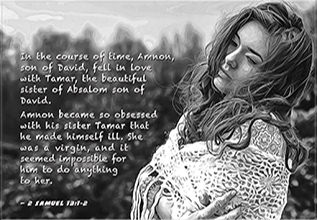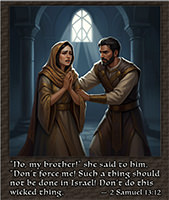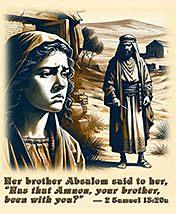2 Samuel 13:1–22 . . . Bible Study Summary with Videos and Questions
“Tamar Raped by Amnon”
Starting in chapter 13, we’ll see several things going on. Most apparent is the affair between Amnon and his sister Tamar, as well as Amnon’s death at the hands of his brother Absalom. But beneath this drama is a struggle for succession to the throne.
Amnon was the firstborn and heir apparent to the throne. The second-born son, Kileab (or Chileab), isn’t mentioned; perhaps he died young. But Absalom, the third-born, was eager to gain the throne, which contributed to his planned action to murder his brother Amnon.
The LORD will tell David that never again would his house know peace as a result of his sin. In the rest of this section, from chapter 13 on, we’ll see how this declaration was fulfilled. The first half of this chapter tells the dark story of Amnon, David’s son, who’d sinned against his own sister, Tamar, daughter of David by a different mother. This event resulted in a deep hatred by Absalom, David’s other son, against his brother Amnon. In David’s own family, among his own sons, a bitter spirit of rebellion, evil, and lust, created by David’s own failure, had been spread. He was unable to rebuke his own son since Amnon simply followed in David’s footsteps; Amnon committed the same passion sins for which David himself had set the example, taking Bathsheba and killing Uriah.
[Note: Click the link to This Week’s Passage near the bottom of this page to read today’s Scripture.]
Amnon’s First Sin: Lusting After His Half-Sister (2 Samuel 13:1–14)
When you read this opening fourteen-verse account of David’s relatives, it can be confusing, even when viewing a family tree. Let me see if I can clarify who’s who in this dramatic soap opera episode.
Characters in this plot include David, the father; Jonadab, David’s nephew, son of David’s third brother, Shimeah; Amnon, David’s first-born son of Ahinoam (different mother than Absalom and Tamar); and Tamar and Absalom, full siblings (same mother, Maacah), but, as half-siblings to Amnon, they’re daughter and son of Maacah, who was David’s third wife (the daughter of Talmai, the king of Geshur). Amnon and Tamar were half-brother and half-sister. Amnon’s mother was Ahinoam of Jezreel, while Absalom’s and Tamar’s mother was Maacah.
For most of us, it’s not easy to realize or remember who belongs to whom. So, I made this family connections table to help you appreciate who’s who as you read this chapter.
Amnon (whose name means “faithful”) had a very serious problem. He’d “fallen in love with” his beautiful half-sister, Tamar (whose name seems to mean “date palm”). He didn’t have a way to spend time with her. The king’s grown sons lived in their own homes rather than in the palace. However, Tamar, the king’s virgin daughter, had lived in the palace, probably confined to the women’s quarters and carefully guarded. Amnon probably saw her at family gatherings, but otherwise had no access to her.
According to the Law of Moses, there’s no way he could have had this woman as his wife (see Leviticus 18:11; 20:17). Commentator Pastor Bob Deffinbaugh sees this as Amnon’s problem: Amnon makes himself ill because Tamar is a virgin; because of this, he “was not able to do anything to her.” We are not told that Amnon loves Tamar and wants to marry her. I believe we are told that Amnon wants to have sex with Tamar, but she is a virgin, and that staying so until marriage is her commitment. He wants to have a sexual relationship with her; he is willing, but she is not. She is a virgin and seems intent on keeping it this way. No wonder he couldn’t get anywhere with her. And no wonder he is frustrated. It has gotten to the point that it is making him ill (lovesick?). The symptoms of this “illness” are not stated, but I would imagine possible symptoms would be an upset stomach, a lack of appetite, and lack of sleep.
The story that unfolds is a tale of frustrated lust. Evidently Amnon had no desire to marry Tamar, which he might have been able to do with David’s consent. Yet, Mosaic Law forbade men from marrying their father’s daughters. David was the father of both Amnon and Tamar. The grisly episode is very contemporary and requires little clarification.
The dialogue in the story of Amnon and Tamar suggests the technique used in the episode of Joseph and Potiphar’s wife. Both stories feature a clear “seduction scene,” where direct, forceful language is used by the aggressor: Amnon addresses his half-sister Tamar with almost the exact phrase spoken by Potiphar’s wife in her attempt to accost Joseph: “Come to bed with me!” (Genesis 39:7), adding only one thematically loaded word — “sister” (v. 11) — for Tamar, who responded with an elaborate declaration, just as Joseph had declared to Potiphar’s wife. [The wording of Tamar’s desperate, tearful appeal is highlighted in the image to the left.]
Enter “Jonadab” Amnon’s close friend and cousin Jonadab (whose name means “Yahweh is noble, liberal”), discerns something wrong with Amnon. The author refers to Jonadab as “crafty” (NRSV) and “shrewd” (NIV). Here, Jonadab — who later in this chapter will appear to have been an advisor in the king’s court (2 Sam. 13:32–35) — is wise, but not very ethical.
This shrewd man was a cousin of both Amnon and Tamar. He may have been trying to secure his own political future with Absalom (vv. 3–5, 32–35). It shouldn’t surprise us that one of David’s nephews, Jonadab, had befriended Amnon. After all, they were part of the royal family living in or around Jerusalem. Jonadab couldn’t help noting that, day after day, Amnon was depressed. So when he asked him what was wrong, Amnon said that he was in love with Tamar, his sister, whose brother is Absalom. To shrewd Jonadab, Amnon’s dilemma posed nothing of a problem to him. After all, Amnon was the “son of the king” (v. 4), which inferred that as the “son of the king,” he had the right and authority to please himself to avoid feeling depressed.
That was far as Jonadab’s proposed plan went. From what the author tells us, he didn’t tell Amnon what to do from there; he only suggested how he could get close to Tamar by pretending to be ill and asking her to care for him. And we’re not told that he advised Amnon to send away all the servants (though he may have) or grab her in an effort to persuade her to have sex with him. If Jonadab was as shrewd as our text suggests, surely he must have considered some of the possible scenarios of what would happen after Amnon was able to get Tamar alone. Jonadab must surely share in Amnon’s guilt.
Enter “David” Amnon carried out Jonadab’s plan; it worked just as he’d predicted. His illicit desires were facilitated by Jonadab’s plan, which also made David an unwitting and unwilling participant in this evil scheme when he went to see Amnon, as expected. When Amnon asked David to have Tamar come and prepare food for him in his sight, David complied by giving his “executive order” that sent messengers to Tamar’s house, not unlike those messengers who’d been sent to summon Bathsheba. And so it was that David assisted Amnon at being left alone with Tamar.
As Jonadab anticipated, David arrived, granting Amnon’s request and directing Tamar to go to her brother’s house to bake him cakes. As directed by David, she went there and began to prepare food for Amnon while he was lying down (v. 8). She went about her task, making the dough, kneading it, and then rolling it into little cakes. All the while, Amnon looked on through his open bedroom door. When the cakes were cooked, she attempted to serve him, but he refused. The king’s son then ordered everyone out of the room, instructing her to bring the food to him, in his bedroom, so he could eat from her hand. That she did.
Once alone, all subtlety disappeared. Amnon grabbed hold of Tamar, urging her to lie with him. He didn’t ask her to marry him, just to sleep with him. It’s interesting to note how he worded his request: “Come to bed with me, my sister” (v. 11). Why did he call attention to this fact, reminding her of the very thing that should have prevented him from following through with his evil scheme?
Tamar was truly the innocent victim in this plot. She didn’t encourage Amnon; in fact, she frustrated him by resolving to remain a virgin until marriage. When she went to his house, she did so at David’s command. Amnon ordered all to leave so that no one could come to her aid. It’s hard to believe those who’d left the bedroom didn’t suspect what Amnon had in mind. When he coarsely propositioned Tamar, she answered just as the Law of Moses instructed, saying “No, my brother!” She stated the reason Amnon’s request was wrong: What he’d do to her could never be undone. And she didn’t plead only for herself; she plead with Amnon to act in his own interest. After all, raping her would make him a well-known wicked fool in Israel (v. 13). He, the king’s first-born son, the crown prince, would become one of the lowest men in the nation.
Looking back, David had violated God’s will by “sleeping” (Heb. skb ’m) with Bathsheba, evidently with her consent. Amnon, however, violated God’s will by “laying” (Heb. skb ’t) Tamar, forcing her against her will (v. 14). When she suggested that Amnon ask David for permission to marry her, she was evidently stalling for time since the Mosaic Law forbade this kind of marriage. Quite clearly, Amnon’s attraction to Tamar was only selfish infatuation. He was determined to lay with her then and there. He was bigger and stronger and, although it wasn’t right, he’d prevail (v. 14).
Amnon’s Second Sin: Rejecting His Half-Sister (vv. 15–19)
Now that Amnon had raped Tamar, his “love” for her turned to intense hatred, wanting no more contact with her (v. 15). Why would he now “hate” the sister whom he once “loved”? First, because he never truly loved her; rather it was infatuation fed by obsessive lust. Second, he was probably transferring to her the loathing he’d felt for himself for having committed such a despicable act as incestuous rape.
Once again, we see similarities between the first sin of Amnon against Tamar and the sin of David against Bathsheba and Uriah. It was bad enough for David to have slept with Bathsheba, but having killed her husband was even worse. So too with Amnon’s second sin of casting Tamar off after he’d violated her (v. 17).
Looking back at this bedroom scene, if it was Amnon who first clung to Tamar, refusing to let her go, it now seems that Tamar had clung to Amnon, refusing to go. If he’d violated her, he could have at least married her. But he was further repulsed by this, ordering his servant to throw her out and lock the door behind her (v. 18). The servant obeyed and Tamar left the house, putting ashes on her head and tearing her long-sleeved robe, marks of deep mourning. Leaving, she put her hands on her head and wept.
Absalom Rescues Tamar; David Does Nothing (vv. 20–22)
Enter “Absalom” When her brother Absalom realized what had happened, he consoled Tamar, intending to take vengeance on her behalf, while gaining his own advantage. He probably saw in this incident an opportunity to bring Amnon down so he could advance himself as a candidate for the throne. Tamar remained “desolate” (v. 20), a term in Hebrew that means unmarried and childless, which was a living death for a Jewish woman.
David may have taken no action against Amnon because he realized that people would regard him as a hypocrite for punishing Amnon, since he himself had been guilty of a similar crime. Nevertheless Amnon deserved to die. David was as clearly unable to control his sons’ passions as he was his own. The results of David’s sin with Bathsheba became evident in his relations with his sons. For how could a father discipline his children when he knew that he’d done worse than they’d done? When David’s son raped Tamar, David was very angry (v. 21), yet he took no action, for he, too, had committed his own sexual offense. The upshot, which we’ll see next week, is that Tamar’s brother, Absalom, will murder Amnon (13:29), but, again, David will do nothing, for he, too, had a noteworthy murder on his head.
Having reacted angrily to this critical event, David took never punished the sinful perpetrator. The king’s son — heir to the throne — could get away with rape and incest. Perhaps the very reason Amnon raped his sister was because he was sure that his father wouldn’t do anything to him. What David could have done — and probably should have done — would have been to formally remove Amnon from succession to the kingship for such a despicable act. However, beyond being angry, he didn't do a thing. Sadly, he’d lost the moral authority he’d had as the righteous king who loved Yahweh.
† Summary of 2 Samuel 13:1–22
Today’s passage describes a tragic and disturbing event within King David’s family involving his children Amnon, Tamar, and Absalom. Amnon, David’s eldest son, becomes infatuated with his half-sister, Tamar. Following a manipulative plan advised by his crafty cousin Jonadab, Amnon pretends to be sick and persuades King David to send Tamar to prepare food for him (13:1–5). When Tamar is alone with Amnon, he forcibly rapes her despite her protests and warnings about the consequences (vv. 6–14). After the assault, Amnon’s feelings turn to anger rather than compassion; he harshly rejects Tamar, forcing her out and leaving her devastated and shamed (vv. 15–18).
When King David hears about the incident, he gets very angry but doesn’t take action against Amnon, likely because Amnon is his eldest son and heir (v. 21). Tamar flees to the house of her full brother Absalom, who takes her in, comforts her, and harbors a growing hatred for Amnon (vv. 20–22). This event sets the stage for future strife and family tragedy, highlighting the devastating effects of sin, abuse of power, and broken justice within David’s household.
Key points with verse references:
• We see Amnon’s obsessive desire for Tamar and his plotting to be alone with her (vv. 1–5).
• Amnon’s rape of Tamar occurs despite her resistance and the law (vv. 6–14).
• Amnon gets angry and rejects Tamar immediately after the assault (vv. 15–18).
• Tamar is grieved and runs to Absalom’s house, where she’s comforted (vv. 19–20).
• David shows his anger but fails to punish Amnon,; Absalom’s hatred builds toward Amnon (vv. 21–22).
This Week’s Passage
2 Samuel 13:1–22
New International Version (NIV) [View it in a different version by clicking here; also listen to chapter 13 narrated by Max McLean.]
Summary Video: “The Second Book of Samuel”
† Watch this introductory video clip created by BibleProject on bibleproject.com.
- Q. 1 Why does God allow the innocent to suffer at the hand of the wicked?
- Q. 2 How could David judge his own son for sexual sins and not judge himself?




